The Maine Charitable Mechanic Association in Portland, Maine, is selling its exquisite collection of early 19th century silk guild banners. Trade associations used to promote their wares by carrying painted silk banners describing their art with clever puns and beautiful images during town parades. Everyone from freemasons to blacksmiths to hatters made these kinds of banners.
The Maine Charitable Mechanic Association was created in 1815 to help train apprentices, and has kept 17 of these beautiful pieces of labour history from the 1830s. Sadly, they have an 1850s building in dire need of repair, plus a bunch of programs that need the funding. Since they don’t have the money to keep the banners in a secure, properly controlled environment for their conservation, they’ve decided to put them up for auction.
You can browse the catalogue to see all 17 of them; the banners start at lot 2114. (Not that the rest of the lots aren’t worth browsing. This little auction house in Maine has some awesome pieces for sale, ranging from lovely local folk art to Aubusson tapestries.)
There has been some controversy over the sale. Nobody wants to see these treasures of Maine labour history dispersed into private collections. The auction house is being surprisingly accommodating, thankfully, so there’s a chance the banners might remain in state in a museum that can properly house them.
Buyers interested in the whole collection, rather than single lots, can make presale offers, Mr. Julia said; he will allow the winning bidder to pay off the bill over time rather than upfront. Estimates range from $2,000 for the tailors’ banner with a wreath around the phrase “Think and Act” to $30,000 for the shipbuilders’ painting of a three-mast vessel captioned “By Commerce We Live.”
Steve Bromage, the assistant director of the Maine Historical Society in Portland, wrote in an e-mail that “a consortium of Maine museums is working together to raise funds to participate in the auction.”
Given the “significant historic value of these banners,” he wrote, there is “a strong desire to keep them in Maine and accessible to the public.”
Here are a few of my favorites, but I really could have posted them all because I am completely in love with them. All my latent syndicalism has come gushing forth in a great geyser of adoration for these gorgeous banners.
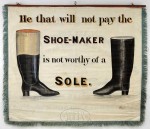
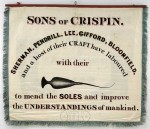

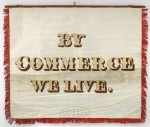
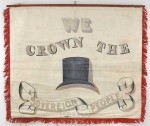
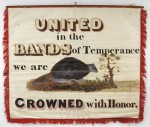
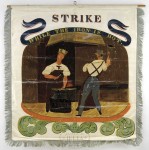
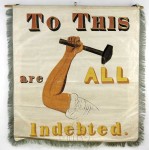
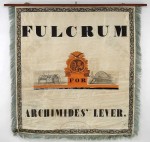
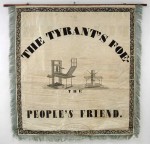
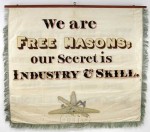

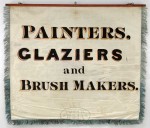
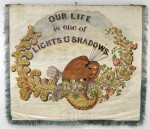
You can almost smell the past by looking at these silk banners.
Nothing wrong methinks with such artifacts going to private collectors as long as they make them accessible to the public. I understand the UK has a law to this effect. I wonder if it’s the same case in the US.
I’m afraid there is no such law here, and even the UK law requires the antiquity be of national importance. I’m not sure the banners would quite qualify.
I’d just hate to see them split up and taken out of state, is the thing, and private collectors aren’t likely to buy them all at once and keep them on public display in Maine. Here’s hoping the museums are able to scrounge up enough to money to keep the collection together.
They really are vibrant historical markers, aren’t they?
You will be happy to hear that Maine Historical Society and a consortium of Maine Museums were able to purchase the whole collection at auction for a bargain price of $109,000 hammer price and the precious 1841 Parade Trade Banners will now be cared for in Portland Maine where they were created
That is fantastic news! I’m delighted to hear it. My parents lived in Portland for a few years, and I love the city. The banners are a perfect fit for its 19th century whaling charm.
Here is the press release that ran 8/30 on the Banners:
MAINE MUSEUMS AND HISTORICAL ORGANIZATIONS RALLY TO SAVE IMPORTANT 19th-CENTURY BANNERS
(Portland, Maine) On Thursday, August 26, sixteen Maine museums, historical organizations, and their supporters came together in an unprecedented collaboration to save an important collection of Maine artifacts, seventeen rare, 19th-century hand-painted banners commissioned by the Maine Charitable Mechanic Association. The banners were purchased for $125,350 and will be housed at the Maine Historical Society in Portland.
At the end of July, Maine museums and historical organizations learned that these banners were to be consigned for sale to James D. Julia Inc. auction house in Fairfield, Maine. Knowing the significance of these works and their value in keeping them in the public domain for future generations, Maine museums and historical organizations rallied together to raise funds to purchase them. The following organizations were involved: Maine Historical Society, Portland Museum of Art, Maine State Museum, Maine Maritime Museum, the Maine State Historian, Bates College Museum of Art, Bowdoin College Museum of Art, and Colby College Museum of Art. Corporate and individual support was provided by: James Julia, L.L. Bean, Diana and Linda Bean, Chris Livesay, Elsie Viles, Libra Foundation, and an anonymous Boston foundation. Harry Rubenstein, chair of the Division of Political History from the Smithonian’s National Museum of American History, was also in attendance at the auction.
“The focus, hard work, and unselfish generosity of the cooperating museums was unprecedented in my experience,” said Richard D’Abate, Executive Director of the Maine Historical Society. “I think we owe that to our common recognition that the banners were one of the state’s true artistic and historical treasures. They had to be saved.”
“These banners are important symbols of community and it was key that we keep them together and in Maine,” said Portland Museum of Art Chief Curator Thomas Denenberg.
“The Smithsonian’s National Museum of American History was glad to support the effort to keep together this important collection of artisan banners. The beautifully illustrated banners recall the ideals of a community based on values of productive citizenship and industry. They are a true national treasure,” said Harry Rubenstein, chair of the museum’s Division of Political History. “I can think of no better result than having them preserved and remain in the state. We look forward to future collaboration with the Maine Historical Society and other consortium partners.”
The Maine Charitable Mechanic Association, located in downtown Portland, created this series of linen banners in the early 1800s to promote skilled trades. The majority of the banners were painted by decorative painter William Capen and many have fringe and were attached to wooden arms for hanging or carrying in parades. According to the auctioneer, together the banners were worth between $100,000 and $200,000. The Maine Charitable Mechanic Association decided to sell them for financial reasons.
How beautiful. I find it genuinely touching to see so many institutions, state and national, come together to keep these beautiful pieces of Maine history in their homeland.
Thank you kindly for the update.